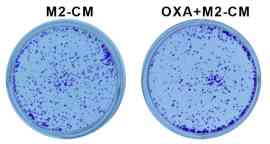Periplocin improves the sensitivity of oxaliplatin-resistant hepatocellular carcinoma cells by inhibiting M2 macrophage polarization
DOI:
https://doi.org/10.17305/bb.2024.10928Keywords:
Periplocin, oxaliplatin, hepatocellular carcinoma, M2 macrophage polarization, chemotherapy resistanceAbstract
The aim of this research was to investigate the impact of periplocin (PPLN) on oxaliplatin (OXA) resistance in hepatocellular carcinoma (HCC) cells and offer insights for improving clinical treatment of HCC. The IC50 value of HCC cell lines against OXA was detected by the CCK-8 assay, and an OXA-resistant HepG2 cell line (HepG2/OXA) was constructed. THP-1 cells were induced into M1 or M2 macrophages, and M2 macrophage-conditioned medium (M2-CM) was prepared. M1 and M2 macrophage polarization were detected using RT-qPCR and flow cytometry. CCK-8, EdU staining, clone formation assay, flow cytometry, and western blotting were used to assess the proliferation and apoptosis of HepG2/OXA cells treated with PPLN and M2-CM. Additionally, a nude mouse subcutaneous graft tumor model was constructed. PPLN enhanced the sensitivity of HepG2/OXA cells to OXA, reduced their clone-forming ability, and promoted their apoptosis. Notably, PPLN hindered M0 macrophage polarization to M2 macrophages, while M1 polarization remained unaffected. The proliferation-inhibiting and apoptosis-promoting effects of OXA+PPLN on HepG2/OXA cells were significantly attenuated by the addition of M2-CM, suggesting that PPLN improves the OXA sensitivity of HepG2/OXA cells by hindering M2 macrophage polarization. Furthermore, PPLN inhibited M2 macrophage polarization and improved the OXA sensitivity of HepG2/OXA cells in vivo. In conclusion, PPLN inhibited the proliferation of HepG2/OXA cells, promoted their apoptosis, and inhibited M2 macrophage polarization both in vivo and in vitro, which in turn enhanced the OXA sensitivity of HepG2/OXA cells.
Citations
Downloads

Downloads
Published
Issue
Section
Categories
License
Copyright (c) 2024 Jiefeng Weng, Hui Liu, Zhaofeng Wu, Yu Huang, Shuai Zhang, Yujie Xu

This work is licensed under a Creative Commons Attribution 4.0 International License.









